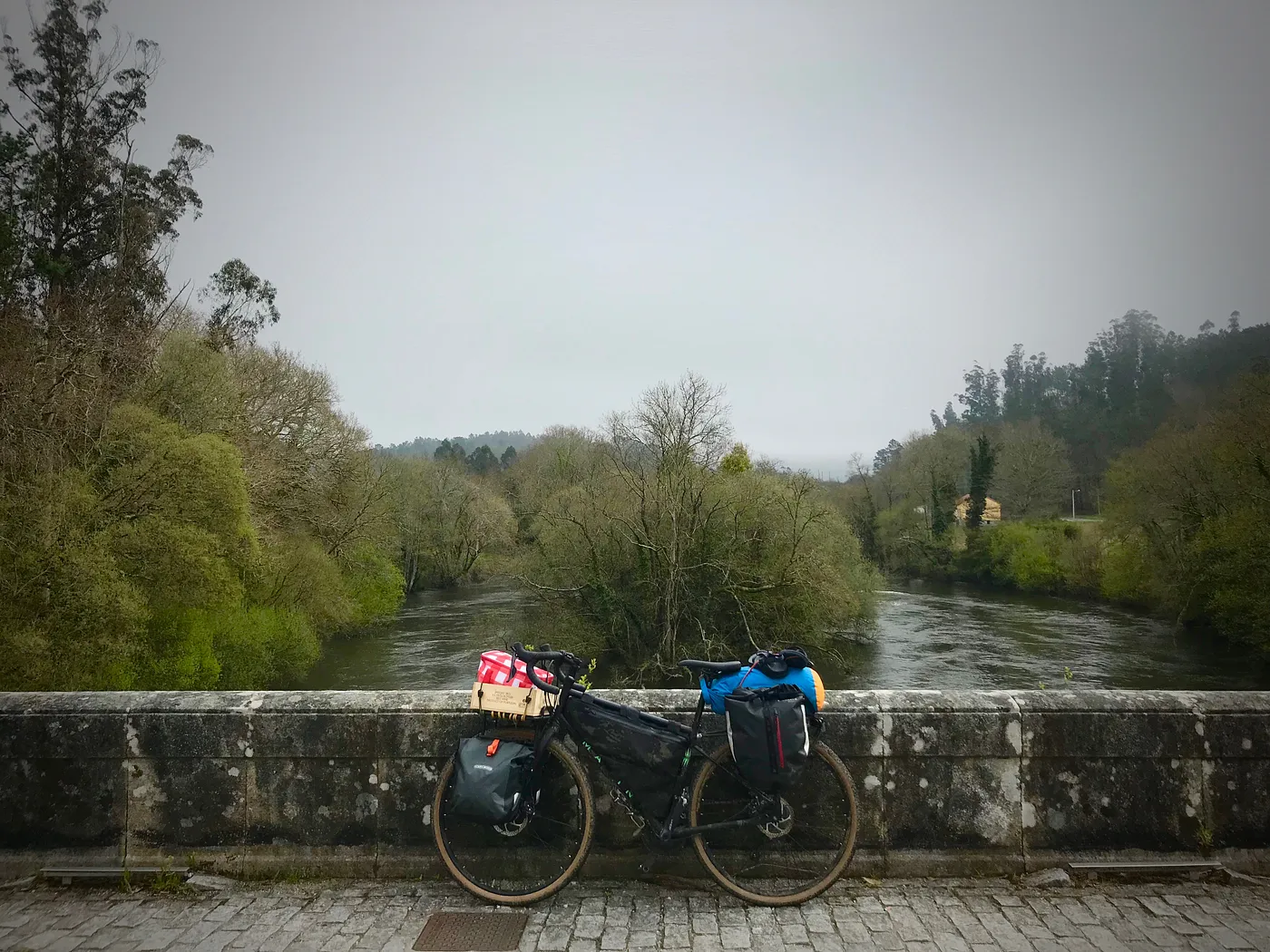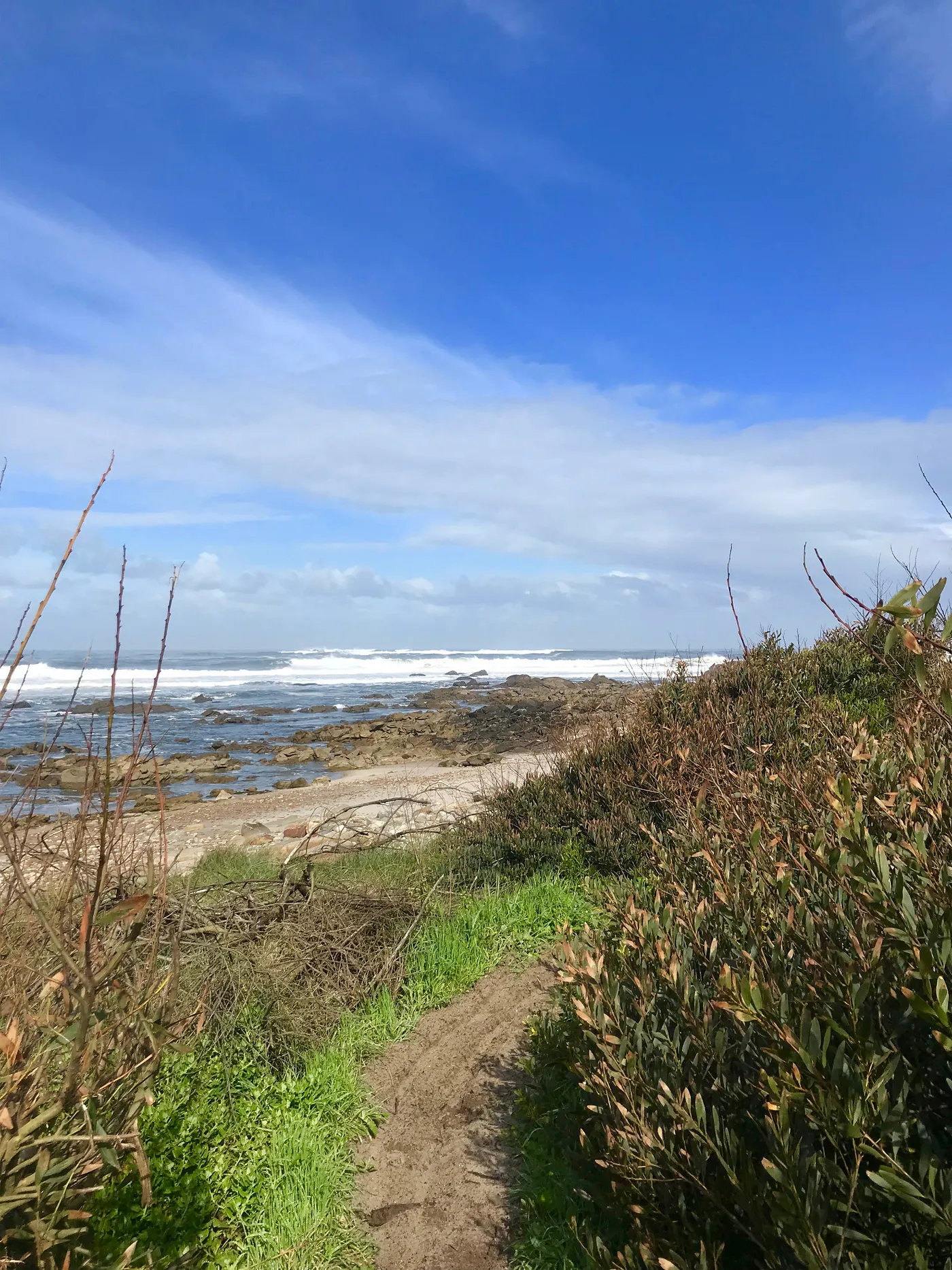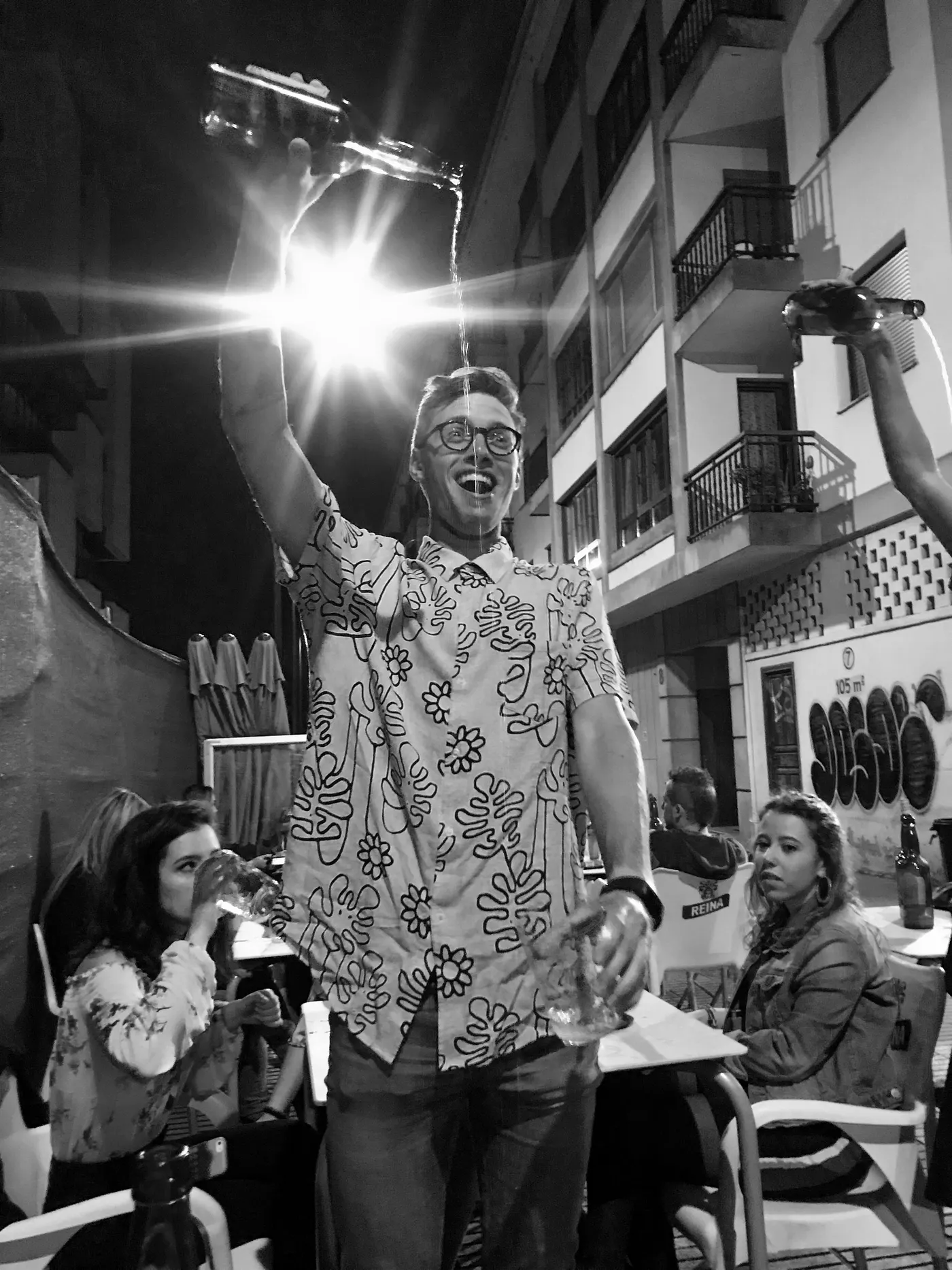Bike Ride
[ This post was originally published on Medium ]A Reflection on my Bike Ride from Porto to Bilbao
 My home for months on end
My home for months on end
Preface
I decided to write this as a retrospective because I wanted to avoid the trickeries of first impressions. Like street swindler, impressions draw me in with their theatrics and then leave me a dollar short. Instead, I let my experiences simmer. The upfront awe or misery burn off, leaving behind a rich, developed memory. In regards to this story, had I captured everything on the fly, it would have been thick with complaints of sore muscles, grey skies, and broken spirits. As this was my first bike tour, I quickly discovered that moments of beauty and accomplishments are threaded through a long narrative of hill climbs, bodily aches, and uncooperative weather, yet when such moments do shine through, it makes it all worth while. With that said, here is an abbreviated account of a bike ride from glasses of Port wine to plates of Pintxos.
Me
This trip was my first bike tour. I’ve spent a decent amount of time on two wheels for commuting and have, within the past couple years, picked up mountain biking as a hobby. Sure I consider myself a velo-connoisseur of sorts because I can change a flat, but my expertise quickly dwindled when I venture out of basic maintenance.
The Trip
This trip was born out of a want to travel, but was immediately confined by the desire to escape the grand tourist circuits. You know the kind, an endless stream of travelers all visiting the same cities, eating the same foods, seeing the same sights, taking the same pictures; it can really zap the magic out of what was once a unique experience. So after catching wind of this “bikepacking” concept, which is essentially bike touring on dirt and camping along the way, I decided to give it a shot. I broadly chose Europe as the destination, Portugal as the start, and somewhere East of Portugal as the finish.
Which brings us to the international airport of Porto. After an anxious 30 minutes waiting for my bike to show up, a battered box containing an unscathed 2018 Marin Four Corners and panniers full of polyester clothing, notebooks, and some other typical travel supplies, materializes on the oversized luggage carousal.
I spend around 5 nights in Porto; I booked for 6, but cut it a day short because the open road was beckoning. Unlike other European cities, Porto isn’t needy. The city doesn’t feel a need to boast about a roman artifact or a celebrated style of cooking. Instead, with a warm smile, the people will greet you as an equal, and then offer you a glass of vino verde (a slightly carbonated white wine) and an unpretentious dish of bacalhau (cod) — take it or leave it.
 Shots from Porto
Shots from Porto
From Porto I started north on the Eurovelo 1, which is 1 of 15 long-distance bike paths that crisscross Europe (although I warn you that some sections of it are more conceptual then anything). The times I did find myself on 5’-wide red bike path was great, but I quickly noticed a pattern: every time the path approached a town or city, it would abruptly vanish, leaving me to navigate a labyrinth of tiny cobblestone ruas (streets). This pattern would last me till the Spanish border, yet before I switched countries, there was one last thing I need to experience: the mighty francesinha.
The francesinha is a monumental fork-and-knife sandwich made of 3 different of meats, smothered in cheese and gravy, and then- if that wasn’t enough- topped with a fried egg. It’s heavenly and wrong and delicious and casts a long shadow on American food gluttony (the waiter typically stops by to “top off” the gravy). Afterwards, your mind is in a fog and all bodily mechanics slow down, as if your stomach is calling in assistance from nearby organs.
After recovering from the francesinha hangover, I approach the border of Spain. I’m expecting a clear juxtaposition between the two countries: a change of language, food, and people. Yet when I crossed over the borderline of the Minho River, it wasn’t Spain waiting for me on the other side; it was the strange, unexpected world of Galicia.
A quick history on Spain from someone who’s only had a quick history of Spain:
As is common in many countries, Spain is divided into smaller regions that have their own level of authority. Yet unlike the Federalist system I experience in the US, Spain is divided into autonomous communities, which is conceptually the same as American states, but are granted a tremendous amount of power. And as follows, each autonomous community has their own unique and strongly held identity, often to the extent where they have their own language.
This concept of regional identity led me to have many interesting conversations with the locals. From what I could gather with my second-rate Spanish and numerous hand signals, it wasn’t always clear if Spaniards could recognize who their fellow countryman was or why it matters. I realize this is a gross oversimplification of a series of complicated ongoing issue, but I see this as yet another form of the “us vs. them” narrative. In the US, Italy, and Great Britain, a conversation of the same essence is happening, but it stems from a place of fear or anger. Here in Spain, it seemed to have originated in pride and in some cases reached a conclusion once the delineations were set. Though the intents, stage, and immediate results are vastly different, these conversations are about the separation of a population with the goal of benefiting a subset of people with a common identity. I’m not sure who’s on the other end of this conversation or what the answer is, but it’s interesting to see why and how cultural divides occur and how countries cope with them.
Anyways, back to me. In Spain a few things immediately flipped: barnyard animals filled up my roadside cheering section, the sun immediately emerged from behind a thick curtain of clouds, I came across some great single trail, and Instagram simply stopped, which as it being the final thread connecting me to social media, I think happened for the best. And since the universe needs to remain balance and I was due for some misfortune, a few miles after I crossed the border, I went over my handlebars and landed a mere inches away from a dog turd. This is actually the second time I flipped over my bars; both times I rode away unscathed with just a busted ego and a mouthful of dirt.
 View from the cockpit
View from the cockpit
For the next however-many days, I was in this pendulum of good-then-bad luck. I’d ride an hour in a rainstorm and then get a free churro. I’d misread my map and unnecessarily climb an mountain, and then get a free Iberico ham sandwich. I’d get trapped on busy road with passing trucks fraying my nerves and then get a free pizza baguette thing. It actually turns out these free goodies are a regional interpretation of tapas and are customary at any bar / restaurant / café. With that said, maybe a more truthful positive would be biking through a never-ending countryside of wildflowers that’s dotted with forgotten stone farmhouses being peacefully reclaimed by nature while a herd of pugs run beside me to create the world’s most ferocious peloton.
My first destination in Galicia was the Museo do Alemán in the sleepy village of Camelle. The story goes, a man from German simplified his name to Man and hermitted away in an off-the-map town in which was once the end of the world. As an artist, a naturalist, and a recluse, he spent his time cultivating a sculpture garden that sprawled out from his front door. Somewhere between 50 and a thousand years after he settled, a nearby oil tanker spilled and the ocean washed barrels upon barrels of unrefined oil onto his life’s work. Shortly after, he died. In the years to follow his death, some form of entropy claimed the rest of his work; either in the shape of an unusually violent storm or an indolent mind behind a can of spray-paint.
Today, the town hosts a museum exhibiting what remains of Man’s art and musing. The town also displays imminent white buildings and a crescent shaped beach, which according to the photographs scatted threw the town’s establishments, is typically sunny and thronged with happy families. Yet despite the propaganda, what was most notable to me was the melancholy Man left behind. The towns inhabitants, forced to consume this leftover sadness, all seem a shade dimmer. The animals all seem slower and uninterested. It was palpable.
 One of Man’s few remaining pieces
One of Man’s few remaining pieces
n search of a mood change, I travel eastwards along the Atlantic coast. By this point I’ve pedaled over 300km and my travel days begin to find a recurrent groove:
A typical day began with some meditation and a breakfast consisting of delicious fresh-squeezed OJ and some no-thrills bread. I’d then either find one of two minor highways that stretch along the Atlantic or jump on the Camino del Norte- one of the many pilgrimages to the Catedral de Santiago de Compestela. Around midday I’d break to find a panaderia (bakery) and fruteria (fruit and veggie stand), and then picnic in the town plaza. Roughly 80km from when I started, I’ll have reached my hostel/hotel/Airbnb, in which I’ll plan for the next day, explore the town, eat dinner, sleep, and repeat. If that’s the outline, color in some interesting/strange/nice/mean people, beautiful landscapes, photogenic landmarks, lesser known wonders, cow poop, quasi-stray dogs, gelato, espresso, majestic white horses standing stoically in an open field, a little more gelato and you’d have my typical day.
My first break from the travel day painted above was in the city of A Coruña. A city ahead of its time, A Coruña backlashes against the standard European narrative and stars a woman as the central role. Up to now, the historic landmarks I’ve seen have had one of the following stories: A man built this while in war with other men, a man build this to express his love to a woman, who most likely had no say in the matter, or a man build this to prove he possesses some characteristics only a man such as himself could have possessed (See: every monument to Hercules).
When A Coruña hosted the battle that every European town is destined to host, the men all saw a possibility of defeat, sunk into themselves, and gave up. When it was time for the hero to arrive, Maria Pita climbed above everyone and shouted “Quen teña honra, que me siga” (Whoever has honor, follow me). The tides turned and A Coruña was saved. From the perspective of a traveler, A Coruña now promotes a more progressive message with femininity at the core. How and if this messages transfers to societal status, I’m not sure.
A couple hundred kilometers after A Coruña, I enter the ancient historic communities of Asturias and Cantabria. Though they’re two separate autonomous communities that have two unique histories, they find a commonality with their love of cider and stinky cheese. In both regions, I didn’t feel especially awed by their cities or food. Most of the time, their cities could hold my interest for no more than 48-hours before I felt a need to travel onward. Yet, wherever I was and whomever I was with, cider and potent cheese was always in the picture.
The cider of northern Spain is equal parts drink and theater. Typically served in a bottle slightly too large for the individual drinker, drinking cider is group activity. And because the fermentation process leaves the cider only partly carbonated, the bartenders have developed a special pouring technique to reinvigorate the drink. With arms fully extended, the bartender will hold the bottle overhead and a skewed glass directly under it. Then without focusing on either the bottle above or the glass below, the bartender slowly pours the cider so it falls a wingspan distance before landing in the crescent opening of the tilted glass below.
 Me trying my hand at pouring cider while unimpressed locals watch
Me trying my hand at pouring cider while unimpressed locals watch
A few billion pedals later, I reach my destination: Bilbao. Along the way I reach some beautiful and curious places and meet some even more beautiful and curious people; yet their stories won’t find their way in here. Instead, I’ll fill this space with some personal musings that will perhaps lead us in a different and unexpected direction:
Before my trip I read articles trumpeting the benefits of travel, while during my trip, I meet too many people either answering impossible questions or explaining to me that a traveler’s life is the best life. Personally, I’m unconvinced that travel is the best medicine; or even a medicine at all.
Before this trip I was stuck. To get out the rut I was in, I put myself on a mental diet, which included meditating, journaling, and a framework that allowed newness into my daily experience. I then took my newly formed mind overseas. I believe it was my mental structuring that gave richness to my trip and not the other way around.
The problem I find with the traveling-is-the-answer mindset is that it places you either in the wrong timeframe or it misidentifies the solution. When traveling for a purpose, it focuses your attention on the past and future. What could I have done differently had I known what I do now? How can I bring this new experience into my life back home? Thoughts of this nature- thought that bring you away from the present moment- can be extremely beneficial, but like your favorite vino verdo, it should be done moderately and doesn’t need to be enjoyed overseas. Additionally, while traveling, you may find curiosities and interests that initiates a drive to experience new things and grow. I understand that a change of setting may lead to a betterment of self; however, what most people miss is the aforementioned personal growth was actualized by the individual and not the surroundings. Traveling may have nudged you in the right direction, but it was the individual that did all the heavy lifting.
Afterword
This was just the first leg of my travels. From Bilbao, I’ll travel into the Pyrenees, then along the Mediterranean coast, ferry to Tunisia, and then again to Italy. Today, we’ll leave it here, but maybe tomorrow I’ll continue the story. In any case, thanks for reading! 🚲